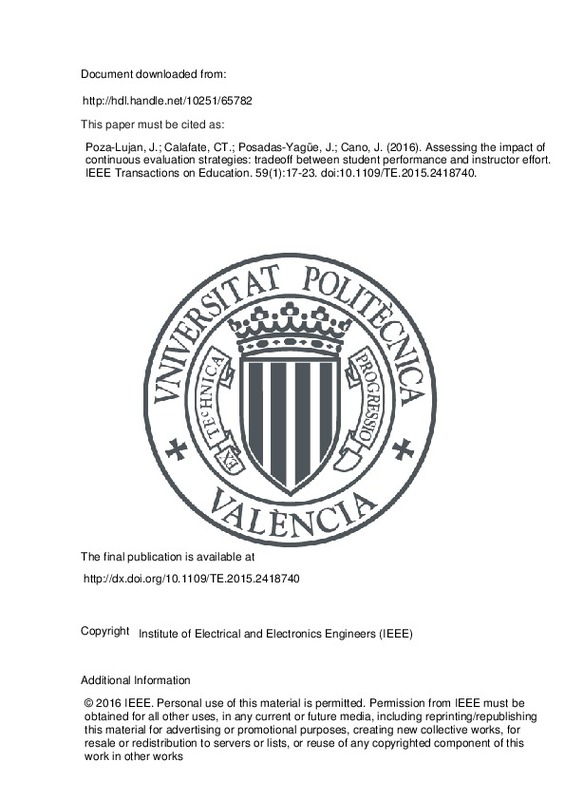JavaScript is disabled for your browser. Some features of this site may not work without it.
Buscar en RiuNet
Listar
Mi cuenta
Estadísticas
Ayuda RiuNet
Admin. UPV
Assessing the impact of continuous evaluation strategies: tradeoff between student performance and instructor effort
Mostrar el registro sencillo del ítem
Ficheros en el ítem
| dc.contributor.author | Poza-Lujan, Jose-Luis
|
es_ES |
| dc.contributor.author | Tavares de Araujo Cesariny Calafate, Carlos Miguel
|
es_ES |
| dc.contributor.author | Posadas-Yagüe, Juan-Luis
|
es_ES |
| dc.contributor.author | Cano Escribá, Juan Carlos
|
es_ES |
| dc.date.accessioned | 2016-06-13T15:05:50Z | |
| dc.date.available | 2016-06-13T15:05:50Z | |
| dc.date.issued | 2016-02 | |
| dc.identifier.issn | 0018-9359 | |
| dc.identifier.uri | http://hdl.handle.net/10251/65782 | |
| dc.description | © 2016 IEEE. Personal use of this material is permitted. Permission from IEEE must be obtained for all other uses, in any current or future media, including reprinting/republishing this material for advertising or promotional purposes, creating new collective works, for resale or redistribution to servers or lists, or reuse of any copyrighted component of this work in other works | es_ES |
| dc.description.abstract | [EN] Current opinion on undergraduate studies has led to a reformulation of teaching methodologies to base them not just on learning, but also on skills and competencies. In this approach, the teaching/learning process should accomplish both knowledge assimilation and skill development. Previous works demonstrated that a strategy that uses continuous evaluation is able to meet both objectives. However, those studies did not evaluate and quantify the additional effort required to implement such strategies. This paper evaluates the additional instructor effort required when implementing continuous evaluation in a first-year Computer Fundamentals course in the Computer Engineering degree program at the Technical University of Valencia, Spain. The experiment quantifies how instructor workload increases under different continuous evaluation strategies and how this affects the overall student grade. Both the standard continuous evaluation method and the intensive continuous evaluation method are analyzed, the latter being a proposal that builds upon the standard method by increasing the number of tests and examinations. The results obtained reveal that continuous evaluation improves student grades but that intensive continuous evaluation is liable to generate an excessive instructor overload without having a significant impact on student scores. | es_ES |
| dc.description.sponsorship | This work was supported in part by the Department of Computing Engineering (DISCA) and the School of Informatics (ETSINF) of the Universitat Politecnica de Valencia (UPV). | en_EN |
| dc.language | Inglés | es_ES |
| dc.publisher | Institute of Electrical and Electronics Engineers (IEEE) | es_ES |
| dc.relation.ispartof | IEEE Transactions on Education | es_ES |
| dc.rights | Reserva de todos los derechos | es_ES |
| dc.subject | Continuous assessment | es_ES |
| dc.subject | Formative assessment | es_ES |
| dc.subject | Instructor wokload | es_ES |
| dc.subject | Student performance | es_ES |
| dc.subject.classification | ARQUITECTURA Y TECNOLOGIA DE COMPUTADORES | es_ES |
| dc.title | Assessing the impact of continuous evaluation strategies: tradeoff between student performance and instructor effort | es_ES |
| dc.type | Artículo | es_ES |
| dc.identifier.doi | 10.1109/TE.2015.2418740 | |
| dc.rights.accessRights | Abierto | es_ES |
| dc.contributor.affiliation | Universitat Politècnica de València. Departamento de Informática de Sistemas y Computadores - Departament d'Informàtica de Sistemes i Computadors | es_ES |
| dc.description.bibliographicCitation | Poza-Lujan, J.; Tavares De Araujo Cesariny Calafate, CM.; Posadas-Yagüe, J.; Cano Escribá, JC. (2016). Assessing the impact of continuous evaluation strategies: tradeoff between student performance and instructor effort. IEEE Transactions on Education. 59(1):17-23. doi:10.1109/TE.2015.2418740 | es_ES |
| dc.description.accrualMethod | S | es_ES |
| dc.relation.publisherversion | http://dx.doi.org/10.1109/TE.2015.2418740 | es_ES |
| dc.description.upvformatpinicio | 17 | es_ES |
| dc.description.upvformatpfin | 23 | es_ES |
| dc.type.version | info:eu-repo/semantics/publishedVersion | es_ES |
| dc.description.volume | 59 | es_ES |
| dc.description.issue | 1 | es_ES |
| dc.relation.senia | 301704 | es_ES |
| dc.contributor.funder | Universitat Politècnica de València |







![[Cerrado]](/themes/UPV/images/candado.png)

